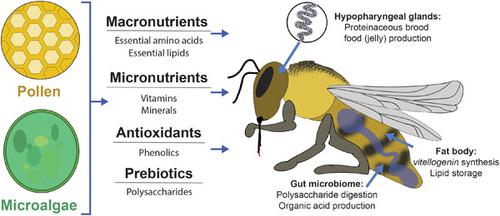当前位置:
X-MOL 学术
›
Arch. Insect Biochem. Physiol.
›
论文详情
Our official English website, www.x-mol.net, welcomes your
feedback! (Note: you will need to create a separate account there.)
Microalgae as a promising and sustainable nutrition source for managed honey bees.
Archives of Insect Biochemistry and Physiology ( IF 1.5 ) Pub Date : 2020-01-24 , DOI: 10.1002/arch.21658 Vincent A Ricigliano 1
Archives of Insect Biochemistry and Physiology ( IF 1.5 ) Pub Date : 2020-01-24 , DOI: 10.1002/arch.21658 Vincent A Ricigliano 1
Affiliation

|
Managed honey bee colony losses are attributed to a number of interacting stressors, but many lines of evidence point to malnutrition as a primary factor. Commercial beekeepers have become increasingly reliant on artificial pollen substitute diets to nourish colonies during periods of forage scarcity and to bolster colony size before pollination services. These artificial diets may be deficient in essential macronutrients (proteins, lipids, prebiotic fibers), micronutrients (vitamins, minerals), and antioxidants. Therefore, improving the efficacy of pollen substitutes can be considered vital to modern beekeeping. Microalgae are prolific sources of plant‐based nutrition with many species exhibiting biochemical profiles that are comparable to natural pollen. This emerging feed source has been employed in a variety of organisms, including limited applications in honey bees. Herein, I introduce the nutritional value and functional properties of microalgae, extrapolating to central aspects of honey bee physiology and health. To conclude, I discuss the potential of microalgae‐based feeds to sustainably provision managed colonies on an agricultural scale.
中文翻译:

微藻是有管理的蜜蜂的有前途和可持续的营养来源。
控制的蜂群损失归因于许多相互作用的应激源,但许多证据表明营养不良是主要因素。商业养蜂人越来越依赖人工花粉替代饮食,以在草料短缺期间滋养菌落,并在授粉服务前增加菌落的大小。这些人工饮食可能缺乏必需的大量营养素(蛋白质,脂质,益生元纤维),微量营养素(维生素,矿物质)和抗氧化剂。因此,提高花粉替代品的功效对现代养蜂业至关重要。微藻是植物营养的丰富来源,许多物种的生化特性与天然花粉相当。这种新兴的饲料来源已被用于多种生物,包括在蜜蜂中的有限应用。在此,我将介绍微藻的营养价值和功能特性,并推断出蜜蜂生理和健康的主要方面。总而言之,我将讨论基于微藻的饲料在农业规模上可持续供应受管理殖民地的潜力。
更新日期:2020-01-24
中文翻译:

微藻是有管理的蜜蜂的有前途和可持续的营养来源。
控制的蜂群损失归因于许多相互作用的应激源,但许多证据表明营养不良是主要因素。商业养蜂人越来越依赖人工花粉替代饮食,以在草料短缺期间滋养菌落,并在授粉服务前增加菌落的大小。这些人工饮食可能缺乏必需的大量营养素(蛋白质,脂质,益生元纤维),微量营养素(维生素,矿物质)和抗氧化剂。因此,提高花粉替代品的功效对现代养蜂业至关重要。微藻是植物营养的丰富来源,许多物种的生化特性与天然花粉相当。这种新兴的饲料来源已被用于多种生物,包括在蜜蜂中的有限应用。在此,我将介绍微藻的营养价值和功能特性,并推断出蜜蜂生理和健康的主要方面。总而言之,我将讨论基于微藻的饲料在农业规模上可持续供应受管理殖民地的潜力。











































 京公网安备 11010802027423号
京公网安备 11010802027423号